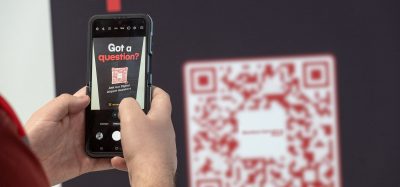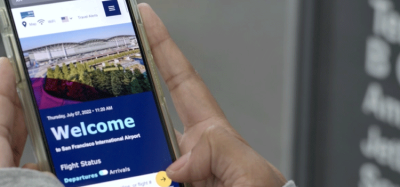Have you considered a hackathon at your airport?
- Like
- Digg
- Del
- Tumblr
- VKontakte
- Buffer
- Love This
- Odnoklassniki
- Meneame
- Blogger
- Amazon
- Yahoo Mail
- Gmail
- AOL
- Newsvine
- HackerNews
- Evernote
- MySpace
- Mail.ru
- Viadeo
- Line
- Comments
- Yummly
- SMS
- Viber
- Telegram
- Subscribe
- Skype
- Facebook Messenger
- Kakao
- LiveJournal
- Yammer
- Edgar
- Fintel
- Mix
- Instapaper
- Copy Link
Posted: 16 September 2020 | Niamh O’Brien - Dublin Airport | No comments yet
Niamh O’Brien, Head of Dublin Airport’s The Future Factory, explains how hackathons have led to the creation of accessibility concepts that have greatly improved the PRM experience within the airport.
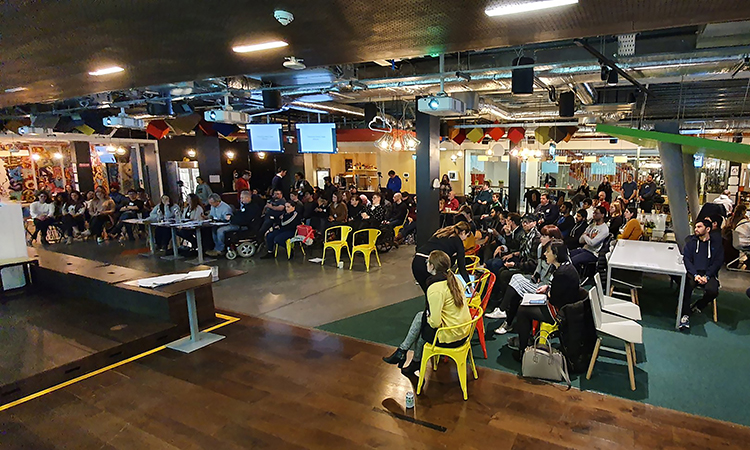

Dublin Airport is the fifth busiest airport in Europe and one of the fastest growing in the world, with passenger numbers rising from 18.4 million in 2010, to 32.9 million in 2019. Before COVID-19, passenger numbers were predicted to double over the next 10 years, and in this context, we understood the need to put innovation at the centre of our development strategy in order to meet our customers’ ever-evolving expectations. As a result, Dublin Airport established the dedicated innovation and business development function, ‘The Future Factory’, as part of our five‑year strategy.
‘The Future Factory’
The Future Factory was born with a two-fold mandate; to stimulate and support innovation initiatives that clearly demonstrate commercial viability, and to add value by delivering projects that either decrease costs or increase revenue for the airport and wider ecosystem. All focus now is on our COVID-19 recovery plan for our business and innovation will continue to be an important part of the present and future airport operations at Dublin.
As a team of three, The Future Factory works to unlock joy or solve problems for passengers travelling through Dublin Airport”
As a team of three, The Future Factory works to unlock joy or solve problems for passengers travelling through Dublin Airport. Hosting, sponsoring and participating in Hackathon events for idea generation is one of the methods we deploy to develop the work pipeline and identify projects of significant size and value.
To increase the impact of the hackathons we wanted to ensure they focused on coming up with solutions for solving real business challenges at the airport, including mobility (how people travel to/from the airport), e-commerce, accessibility and creating value beyond the airport journey. It was therefore critical for us to find partners who are just as passionate about solving these problems as we are, and this will be even more important and prudent in a post-COVID-19 airport operating environment.
Dublin Airport: A weekend of hacking and collaborating to solve problems
External collaboration and ideation are key as they bring diversity of thought and skills to the innovation process. Hackathons are great for us to get this diverse input whilst working on solutions at an accelerated pace in a dynamic environment. Over a full weekend in February 2020, the Future Factory team engaged in two separate hackathons, in partnership with Tangent and Hack Access, to solve business challenges and unlock new opportunities.
Tangent
In collaboration with Trinity Business School and Tangent – Trinity’s ideas workspace – The Future Factory sponsored a hackathon event as part of The Future Factory Trinity Innovation Programme 2020. This programme is Dublin Airport’s internal innovation leadership development programme, run collaboratively by Trinity Business School and Dublin Airport. Trinity College Dublin students, mentors and participants of The Future Factory’s programme came together for a full day on 21 February to ideate on specific challenges facing Dublin Airport. The challenges related to e-commerce for retail, product or service development for any stage of the passenger journey and mobility to and from the airport campus. Over just 12 hours, 40 participants pitched over 20 ideas aligned to one of these challenges. The top 10 were chosen by the participants who then formed teams to take these ideas further and form a business plan to bring them to life. Throughout the day, mentors from both Dublin Airport and Tangent provided guidance, challenges and encouragement to the participants to help make their ideas viable, but also bigger! The ideas pitched ranged from e-commerce marketing strategies, to airport staff carpooling and assisted travel. The final challenge for participants was to pitch their idea to a panel of judges within three minutes. The winning idea was ‘AirCare’ a service for passengers over 65 who may require additional guidance or reassurance along their airport journey.
The concept for AirCare is now being developed further as part of The Future Factory Trinity Innovation Programme. Members of the 2020 programme will progress the concept to ensure it is relevant in the current context, bring the idea to trial and assess the results for further advancement.
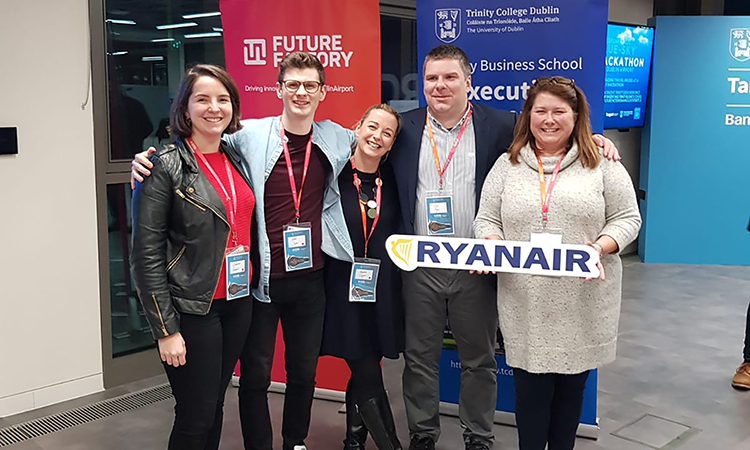

Tangent Hack winning team: AirCare
Hack Access
Hack Access is an organisation that runs an annual hackathon focusing on how to make cities more accessible and inclusive by removing the barriers that can prevent people from working and living. The first Hack Access hackathon was held in Dublin in November 2016. As the hackathon entered its fourth year, Dublin Airport joined as the environment partner. The 2020 event focused specifically on developing solutions and sharing ideas on how to make the journey through Dublin Airport more innovative and accessible for everyone.
In 2019, there was a nine per cent increase in PRM requests on the previous year, compared to a three per cent increase in departing passengers”
Before the COVID-19 outbreak, Dublin Airport was welcoming approximately 100,000 people through the airport every day, of which approximately 1,000 were passengers with reduced mobility (PRMs). During busy days in the summer, this number can reach 1,400. The increase in PRM movements is outgrowing passenger growth at Dublin – in 2019, there was a nine per cent increase in PRM requests on the previous year, compared to a three per cent increase in departing passengers.
We are very active in the accessibility space; providing services such as our Important Flyer Initiative for passengers with autism, airport familiarisation tours and opening a purpose-built sensory room earlier this year – aimed at helping to calm passengers who might feel overwhelmed in the busy and unfamiliar airport surrounding. As a growing international airport, we are always looking for ways to improve the services we offer our passengers and work to enable them to travel through the airport independently if they wish, which is why we decided to partner with Hack Access.
Janice Valentine, Founder and Organiser of Hack Access Dublin, said: “Dublin Airport has already shown a real commitment to accessibility and solving challenges in an innovative way. In engaging with Dublin Airport we’re using a kind of start-up approach to this, by running a validation session.
“We got a group of people with diverse abilities together to give their input and specific experiences of using the airport. Based on that we picked key priorities and key challenges for this year’s hackathon.”
Challenges for Hack Access focused on awareness of services, wayfinding, facilities at the gate and the general airport experience for passengers with diverse levels of ability.
Across the weekend of 21-23 February, eight teams were formed to go through ideation, concept development, validation and pitching. The winning team was ‘Reach Out’, a chatbot to gather more specific and detailed special assistance requirements from passengers, compared to the limited options available today. This could be included in airline, agency or airport interfaces. Dublin Airport will now look to work with the Reach Out team to see how the solution could be trialled at the airport alongside its PRM service delivery partner, OCS.
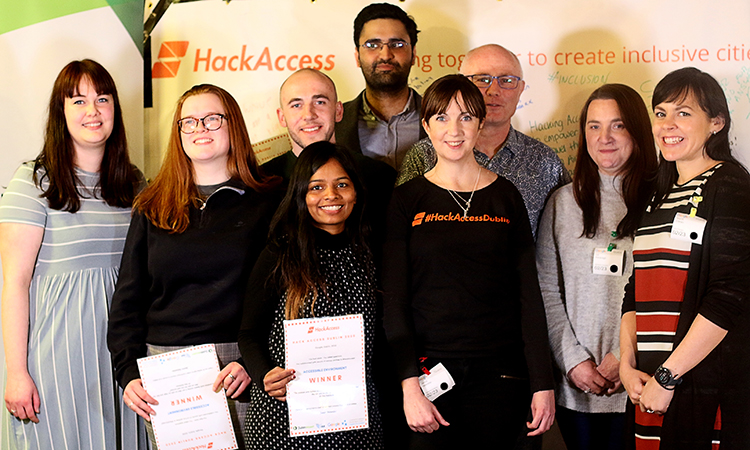

Hack Access winning team: Reach Out
From a Future Factory perspective, the level of insight, experience, ideas and learning to be gained from participating in these events is invaluable. The external collaboration allows us to continue to grow, gather new insights and help create the airport of the future. Both hackathons led to winning concepts that are currently part of The Future Factory pipeline, which will be further developed to assess feasibility, impact and demand, with the aim to bring them both to trial within our business. As travel becomes more accessible for all, we need to continue innovating, ideating and creating exceptional travel experiences, at all stages of a passenger journey.
Managing our way through this crisis and working with customers and stakeholders to properly position our business to come back after this crisis are the key priorities for us at the moment”
It’s important to note, that like many airports across the world, Dublin Airport’s passenger numbers have fallen by 99 per cent due to the global pandemic. Dublin Airport is open and facilitating repatriation flights and essential cargo flights to ensure Ireland’s supply chain is maintained. COVID-19 is now the biggest crisis ever to face the aviation industry. Managing our way through this crisis and working with customers and stakeholders to properly position our business to come back after this crisis are the key priorities for us at the moment.
Biography
Niamh O’Brien is Head of The Future Factory; Dublin Airport’s business development and innovation hub. Having qualified as a Chartered Accountant, O’Brien initially volunteered and worked in the charity sector for an international and humanitarian NGO for seven years. She then joined Dublin Airport’s capital finance team at the end of 2017, working on the North Runway project. In 2019, O’Brien successfully completed the first year of The Future Factory’s Innovation Programme. At the start of 2020, she joined The Future Factory team on a full-time basis.
Issue
Related topics
Airport crisis management, COVID-19, Passenger experience and seamless travel, Passengers with reduced mobility (PRMs), Terminal operations





